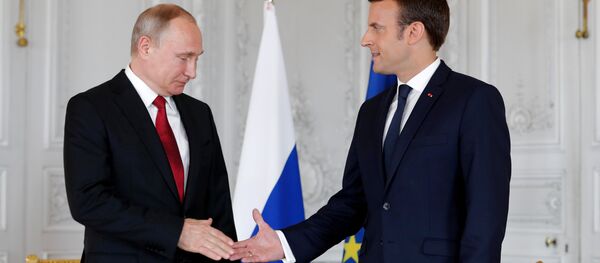PARIS (Sputnik) – Richard Ferrand, who is under preliminary probe on suspicion of nepotism during his time as the head of the medical insurance firm in the region of Brittany, announced that he would step down as territorial cohesion minister on Monday. European Affairs Minister Marielle de Sarnez, Defense Minister Sylvie Goulard and Justice Minister Francois Bayrou are also among those who quit the cabinet within 48 hours. The three aforementioned ministers have been embroiled in a separate preliminary investigation over suspicions of their party, the Democratic Movement (MoDem), having misused the European parliament funds.
Eddy Fougier, political analyst and associate research fellow the French Institute for International and Strategic Affairs (IRIS), reckons that Macron wanted to set an example in order to prove that he is really willing to deliver on his promises regarding the moralization of political life in France.
"Macron’s inflexibility regarding these affairs [the investigations] is to reassure the French people, because what we reproach to the politicians is that they are expected to be ‘clean’ but finally they ‘arrange’ things with reality, and that they do not do what they say they would. Macron puts accents on ‘exemplarity’ and he follows it," Fougier said.
MoDem threw its support behind Macron during his presidential campaign and was then expected to form part of a parliamentary alliance supporting the president. However, after the legislative election where Macron’s Republic on the Move (La Republique En Marche, REM) party came first, taking 308 seats in the National Assembly, MoDem lost its importance to Macron, which played into his willingness to see the party's ministers gone, Fougier noted.
"We need to see how the relationship between LREM and MoDem will develop since the LREM majority does not need these 40 deputies of MoDem. This relationship wouldn’t be that same if LREM still needed Modem. This alliance appeared at a moment when Macron was facing certain difficulties," Fougier explained.
Bayrou, MoDem's leader, was one of Macron's closest allies and the author of a cornerstone reform for the enhancement of civil servants' accountability. Marine Le Pen, the leader of the right-wing National Front party, said on Wednesday that Macron threw Bayrou away "like an old cloth", after "using" him during his presidential campaign. According to Le Pen, that "reveals the state of mind of the president."
Daniel Boy, a senior researcher at Center for Political Research (CEVIPOF) at the French national foundation of political sciences, Sciences Po, said that Macron's team made a small mistake in not realizing earlier that some of the ministers had a problematic past.
"Macron was pretty fast to clean the territory, to get rid of them very fast, so I don't think it will have an impact [on his image]. The question is – why not picture this before they were appointed? They were searching for ministers, looking if they had problems in the past. So, in my opinion, it is a flaw in that work – not to have noticed that those stories existed. Because in reality it was known, it was not a secret," Boy said.
Boy commended the fast changes in the way the civil servants' past was judged.
"It's good that these changes took place so fast, otherwise after it could have seriously complicated the things," Boy said.
It took Macron little time to make the reshuffle following the ministers' leaving and announced the new cabinet composition on Wednesday. Thus, Nathalie Loiseau replaced de Sarnez as European affairs minister, Florence Parly became the armed forces minister instead of Goulard and Nicole Belloubet was appointed the justice minister after Bayrou.
On Thursday, Odoxa poll showed that eight out of 10 French citizens approve of the resignations of Goulard, Bayrou and de Sarnez.
Macron was elected president on May 7 and assumed office on May 14. The first legislation initiated by Macron’s administration was the project on the moralization of political life, aimed to restore people’s trust in politicians via constitutional changes. A draft of the "moralization law" was presented on June 3.




